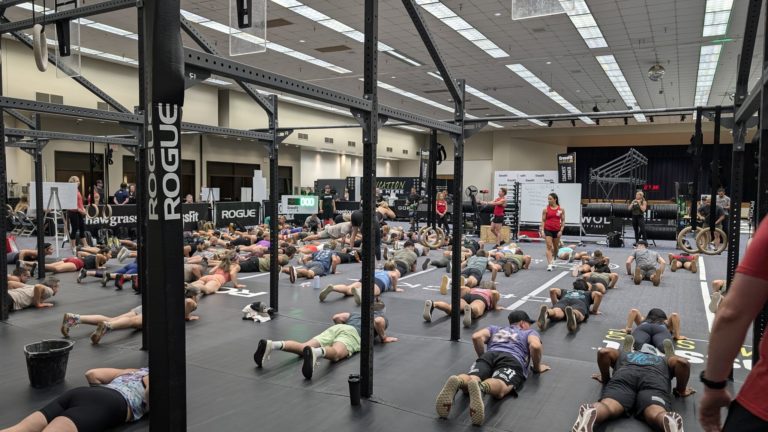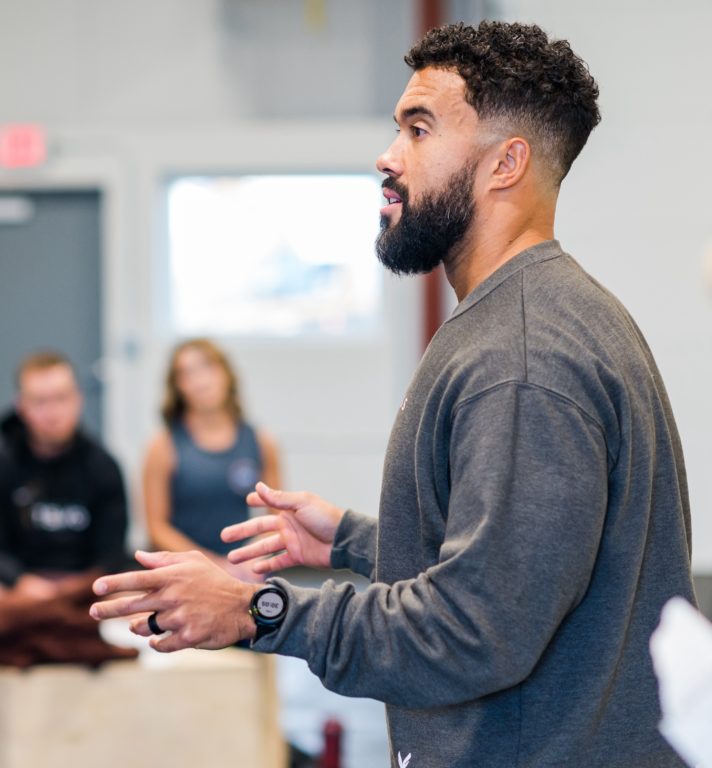Question: How do I successfully coach a class of athletes of different types and abilities and add value to them all?
In a healthy CrossFit community, you will be asked to lead group classes filled with athletes with only days of experience to long-term members of perhaps 10+ years. This is the mark of a healthy, diverse, and growing community, but as a coach, it can present some unique challenges. How do we keep all members as engaged as others, from the newbie to the veteran? The answer to this question will feel too simple to be true, but it doesn’t reduce the value of the response.
 As a coach, you are not there to be an entertainer or a DJ. To lead a quality class experience for novice and veteran athletes, all you need to do is teach, lead, instruct, correct, and inspire. The degree to which you do these things for the athletes present will be as varied as the fitness levels the class exhibits and the scaling needed in their training. This means to teach the air squat, you will continually teach and demonstrate keeping the weight in the heels, leading with the hips in the descent, driving the knees over the toes, executing the full range of motion, and maintaining a neutral spine the same way to all athletes. The degree to which they can hold the standard will differ, and so should the demands and expectations you put on them.
As a coach, you are not there to be an entertainer or a DJ. To lead a quality class experience for novice and veteran athletes, all you need to do is teach, lead, instruct, correct, and inspire. The degree to which you do these things for the athletes present will be as varied as the fitness levels the class exhibits and the scaling needed in their training. This means to teach the air squat, you will continually teach and demonstrate keeping the weight in the heels, leading with the hips in the descent, driving the knees over the toes, executing the full range of motion, and maintaining a neutral spine the same way to all athletes. The degree to which they can hold the standard will differ, and so should the demands and expectations you put on them.
For example, the new athlete will only be able to handle one cue or focus at a time, whereas the veteran may be able to receive two cues at once and correct or improve them both. The new athlete may demand more visual and tactile cues, whereas the veteran may hear a simple verbal cue from across the room and, therefore, take up less of your time in the class to improve their squat. The new athlete will be focused on simply staying rooted in their heels and perhaps getting their hips below their knees; the veteran should be more focused on maturing their overall position to optimize their performance.
The difference in leading these athletes isn’t by the way or the kind of coaching but simply by the degree. As athletes mature and enhance their abilities, coaches may need more education and a higher level of understanding to help better serve them. As athletes grow, so should coaches.
Creating a culture and proper expectations for the service you offer goes a very long way as a coach and leader of a gym. As a coach, you can shape the environment in which your athletes train. When athletes begin their journey with you, they should understand that your job as a coach is to help them optimize their movement, scaling choices, and proper intensity for each day they are there. When an affiliate has clear guidelines and consistency with coaching, athletes can create consistent expectations. Regardless of Day 1 or year 15 in your affiliate, your clients should expect to be taught, led, instructed, corrected, and inspired.
If you have a CrossFit Games competitor or an everyday client in year 15 and their expectations change or they seem bored with revisiting the simple mechanics of an air squat, a press, or a deadlift, then be ready to remind them virtuosity is what they’re here for — doing the common uncommonly well and no athlete is beyond that very focus. Remind them the CrossFit methodology is based on regularly revisiting the basics to break down plateaus in loads or times within our training. Remind them they are here to be taught, led, instructed, and corrected so they may be inspired to achieve their goals.
The answer to this coach’s question is simpler than we desire it to be, but it’s the key to success — never stop coaching your athletes. Continuous coaching is the fuel that keeps your athletes going. Remember, the coaching process, though it may seem complex at times, is fundamentally simple, and your confidence in this simplicity will reassure your athletes of their ability to progress.
Have a question for a coach? Please submit that here.
About the Author
 Adrian Conway (CF-L3) found CrossFit in 2011 and has since managed an affiliate, been part owner of an affiliate, competed at the CrossFit Games five times as an individual, on a team, and as a masters athlete, and has coached athletes to qualify and participate in the CrossFit Games. Adrian has been a member of the CrossFit Seminar Staff since 2013. He spends most of his time now coaching clients remotely and providing programming to affiliates through TRU (Train to Rise Up). He loves being involved with the sport and the methodology through our podcast channels and commentating at the CrossFit Games.
Adrian Conway (CF-L3) found CrossFit in 2011 and has since managed an affiliate, been part owner of an affiliate, competed at the CrossFit Games five times as an individual, on a team, and as a masters athlete, and has coached athletes to qualify and participate in the CrossFit Games. Adrian has been a member of the CrossFit Seminar Staff since 2013. He spends most of his time now coaching clients remotely and providing programming to affiliates through TRU (Train to Rise Up). He loves being involved with the sport and the methodology through our podcast channels and commentating at the CrossFit Games.
Ask a Coach: How Do I Successfully Coach a Class of Athletes of Different Types and Abilities and Add Value to Them All?